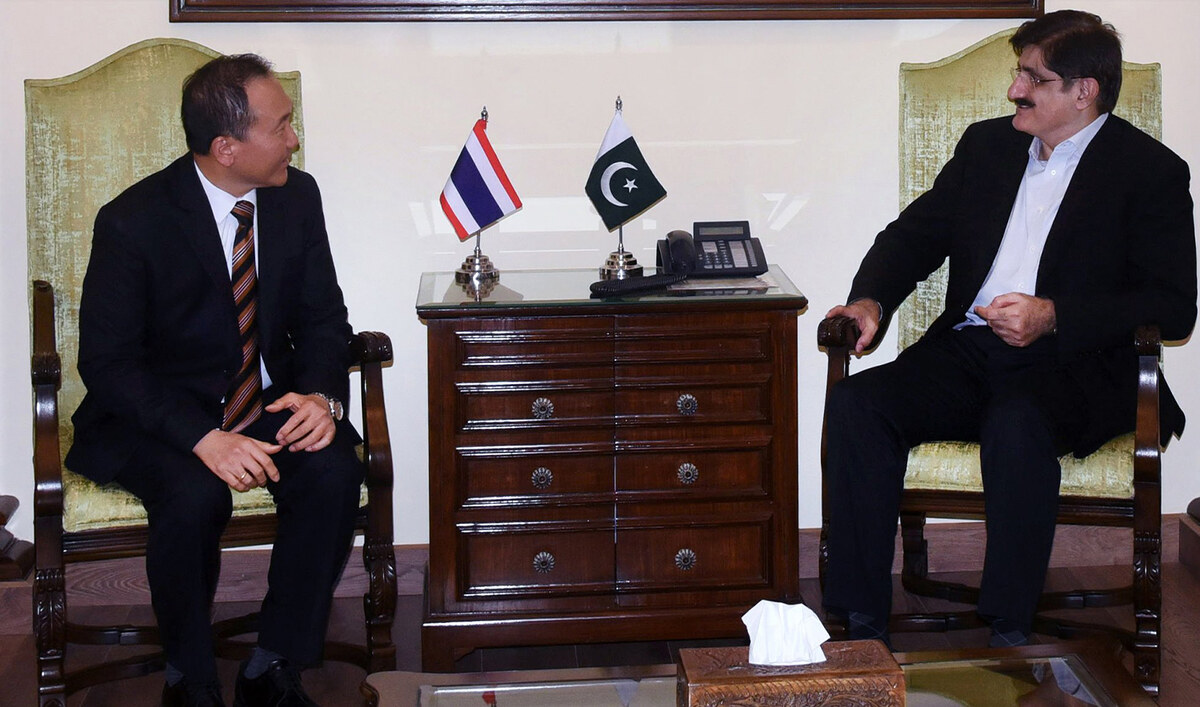LARKANA: As temperatures rose above 52.5 degrees Celsius (126 degrees Fahrenheit) in Pakistan’s southern province of Sindh amid a heat wave last month, a UNESCO world heritage site dating back to 2,500BC also felt the heat.
Archaeologists say ancient ruins are under threat in Mohenjo Daro, a town in Sindh that was once a major center of the Indus Valley Civilization, and where temperatures rose as high as 52.5 C (126 F) in May, the highest reading of the summer so far and approaching the town’s and country’s record highs of 53.5 C (128.3 F) and 54 C (129.2 F) respectively.
“Due to the prevailing heat wave, the ruins of Mohenjo Daro bricks are gradually melting,” Ali Hyder, an archaeological engineer with the Sindh Culture, Tourism & Antiquities Department who is posted in Mohenjo Daro, told Arab News.
“The temperature has been consistently rising to 50-51 degrees Celsius, which is unprecedented … This phenomenon is very dangerous for archaeological ruins in terms of salt crystallization and precipitation that may cause very severe damage to the archaeological ruins.”
Hyder said salt crystallization and precipitation resulting from unusually high temperatures were contracting the unbaked bricks used to build the ancient structures and could lead them to crumble.
“You can see this wall is leaning and the main factor behind the leaning of the wall is extreme weather,” Hyder said as he pointed to a second century stupa built using sun-dried bricks and which had been propped up with metal rods.
“It was also affected by extreme weather. We have provided it with a layer of sun-dried bricks to protect it from heat and rain … Due to rise in temperature, the evaporation and humidity available in the bricks, dehydration process starts, and the rate of deterioration rapidly increases. That is why we [have] provided support ensuring [protection] from further collapse … So that’s a very dangerous situation for Mohenjo Daro.”
Mohenjo Daro, the largest settlement of the Indus Valley civilization, is situated on the banks of the Indus River in Pakistan’s Larkana district, covering over 620 acres of land.
At its peak, the settlement rivaled contemporaneous cities in ancient Egypt and Mesopotamia, with a peak population of 40,000 before the site was abandoned in around 1,900 BCE.
The city was designated a UNESCO world heritage site in 1980.
But human-driven climate change is now threatening its existence, Hyder said.
“In summer the salt available in the ruins contracts and in winter it expands in volume,” he said. “In the end come the [monsoon] rains that wash away different parts of the structural ruins.”
Pakistan ranks among the countries most vulnerable to climate change and has seen untimely downpours, deadly floods, heatwaves and droughts in recent years. A deadly heat wave that hit Pakistan’s largest city of Karachi, the capital of Sindh, claimed 120 lives in 2015.
In 2022, torrential monsoon rains triggered the most devastating floods in Pakistan’s history, killing around 1,700 people and affecting over 33 million. Millions of homes, tens of thousands of schools and thousands of kilometers of roads and railways are yet to be rebuilt.
“SEVERELY DAMAGED”
After the May heat wave, Pakistan witnessed another one in the first week of June and is expected to see a third in the last week of the month, according to Met officials.
But heat is not the only threat to Mohenjo Daro, said Abdul Fatah Shaikh, the director general of the Archaeology and Antiquities Department in Sindh, explaining the damage to the ancient ruins from the 2022 rains and subsequent floods.
“Mohenjo Daro is facing severe threats from extreme weather conditions, particularly rains and heat waves, which have impacted the upper artificial layer of mud slurry covering the original structure,” he told Arab News, saying the structures were so far “safe.”
“But it is still at risk, with a 10 percent impact already from extreme weather,” he added. “To provide extra protection, the upper artificial layer of mud slurry has been increased from 1 inch to 2.25 inches, in accordance with UNESCO guidelines.”
Given rising temperatures, an additional artificial layer of mud slurry was being considered for application from February next year, Shaikh explained.
He said the damage from the 2022 rains and floods had been “conserved and preserved to 75 percent completion so far.”
“To combat these threats, the workforce has been increased from 30 laborers working before the 2022 rains arrived to 80 laborers in the post-2022 rains period to accelerate repairs and maintenance,” the official said. “The Mohenjo Daro site is vulnerable to brick decay, color change, and artificial layer decay due to the heat waves, making prompt action necessary to preserve this ancient archaeological site.”
Jawad Aziz, National Professional Officer (Culture) at UNESCO Islamabad, said Mohenjo Daro had been “severely damaged” during the 2022 monsoon season, including structural destruction like the collapse of walls and the development of cavities and holes in structures due to the loss of mud and bricks.
Heavy rainfall had also affected the drainage system, causing water to accumulate inside the ruins and leading to more damage to the structure.
“In response to the emergency situation, Aziz said, UNESCO mobilized the Emergency Assistance from the World Heritage Fund for the Protection of the World Cultural and Natural Heritage, established in 1977 under Article 15 of the World Heritage Convention.”
“UNESCO also mobilized international experts, who worked with the local team of Directorate of Antiquities and Archaeology, Sindh, and undertook the impact assessment, trained the local staff in disaster risk reduction and conservation techniques and undertook the immediate remedial measures as well as restoration work,” the UNESCO officer said.
“The remedial work focused on improving the drainage system, repaired the flooring, improved wall capping and slopes, underpinning, repaired the visitors path, adding shallow drain, restoration of several structures and cleaning the circular drain which was blocked with silt and wild growth at many spots.”


















